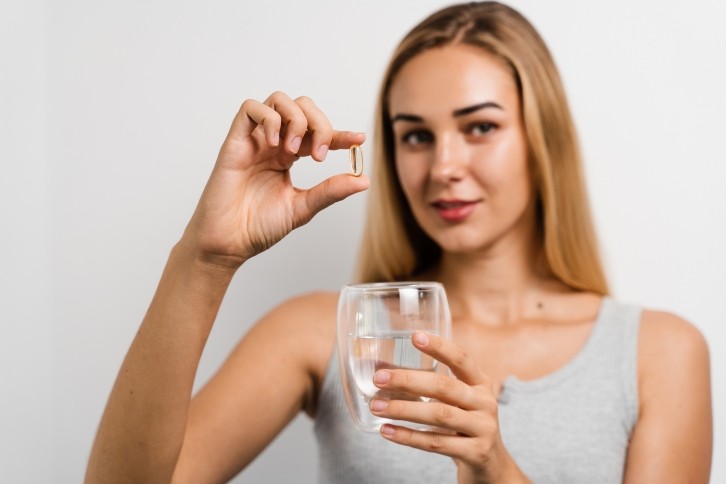Contents
Image: Getty Omega-3 is reportedly “the most sought-after ingredient in beauty supplements,” but formulators are missing a trick in excluding the essential fatty acid for more ‘on-trend’ ingredients, according to experts.
Although collagen has dominated the market for several years, the science behind omega-3 fatty acids for skin health and potential anti-aging benefits is relatively robust.
Omega-3 fatty acids continue to gain more evidence as an anti-inflammatory skincare ingredient and potential preventative ingredient against hair loss.
London-based aesthetic doctor Dr Sophie Shotter is of the belief that omega-3 supplementation should be a “mainstay for many people.”
“Omega-3s are a crucial component of cell membranes and help to support every function of the body,” she said.
“They are known to be a potent anti-inflammatory and crucial for heart and brain health, but one thing many people don’t realize is their important role in skin health.”
Shotter recommends omega-3s to patients with inflammatory skin conditions like acne or rosacea, those suffering with dry skin conditions like eczema, and perimenopausal women struggling with dryness.
That is backed up by the scientific literature, with a 2020 review in the Journal of Cutaneous Medicine and Surgeryv concluding that there are, “many well-studied benefits of O3FA uses in dermatology.
“Given its high safety profile, low cost, and ease of supplementation, O3FA is a reasonable supplement that may benefit patients wishing to improve inflammatory skin conditions through diet,” stated authors from the University of Alberta in Canada.
A key ingredient in beauty supplements
Mintel beauty and personal care research analyst Shiyan Zering told us that omega-3 is actually “the most sought-after ingredient in beauty supplements”.
Consumer data from the market intelligence firm revealed that 41% of current or lapsed beauty supplement users looked for this specific ingredient in the products they take.
Zering believes that supplements made with multifunctional ingredients that offer both beauty and health benefits, such as omega-3, are preferable for most people.
“Consumers are likely to gravitate towards health-focused ingredients because they tend to offer more immediate benefits in contrast to the longer-term effects of beauty supplements,” she explained.
“Additionally, with budgets squeezed, many may opt for options that provide broader health advantages over niche beauty benefits.”
Despite this clear consumer interest in omega-3, Zering said that very few beauty VMS launches in 2024 featured omega-3.
Instead, ingredients like biotin or zinc were more commonly used, which she considers to be “a missed opportunity” for brands.
She explained that by including omega-3 in product formulation, brands can make multiple wellness claims, not only in supporting skin health but also supporting immune health and anti-inflammation.
This is particularly on trend for consumers seeking products to help with ‘inflammaging’ – meaning chronic, low-grade inflammation that typically develops as people age.

How omega-3 supports skin health from the inside out
Many nutritionists recognize the benefits of omega-3 as a holistic skin care solution.
According to associate nutritionist at supplements brand Higher Nature, Lynsey Vaughan, the fatty acids in omega-3 “improve cell flexibility, allowing efficient nutrient flow and waste removal, which promotes a radiant complexion.”
“But while oily fish is the best source of omega-3, only 25% of people consume it regularly,” she explained.
Nutritionist and consultant for UK-based wellness business W-Wellness Maz Packham added that: “Omega-3 supplements can support the aging process by strengthening the skin’s lipid barrier to support hydration improving the skin’s appearance.”
“They are a vital part of cell membranes which help maintain skin elasticity and keep cells resilient, promoting firmness,” she continued.
Rhian Stephenson, nutritionist and founder of supplements brand Artah, said that omega-3 fats “support a healthy phospholipid bilayer, which is important for adequate hydration and skin barrier integrity.”
She highlighted that omega-3 is an anti-inflammatory skin care nutrient, which offers the anti-aging benefits associated with this.
“Inflammation is inherently ‘aging’ so having a good omega-3 status is important for healthy aging,” she said.
Stephenson added that studies have shown that “marine omega-3 supplementation can reduce TNF-α, IL-6 and CRP in non-obese individuals, all of which are markers of inflammation.”
Omega-3 for anti-aging research
A recent study found that omega-3 fatty acids may slow the aging process, however it also showed that the potential benefits weakened for doses of over 1.1 g per day.
Findings published in Frontiers in Nutrition indicated that there may be an optimal dose for omega-3s to delay biological aging, measured using Phenotypic Age Acceleration (PhenoAgeAccel), which is the difference between an individual’s phenotypic biological age (determined using biochemical markers) and their chronological age.
The study indicated that factors such as gender, age, ethnicity and hypertension may influence the relationship between omega-3 intake and PhenoAgeAccel.
“Males and participants aged 60 and above exhibited a stronger negative correlation with omega-3 intake, possibly reflecting differences in bioavailability, metabolic pathways or omega-3 fatty acid needs among different populations,” said the researchers.
A review in Nutrients in 2022 also reported that the scientific literature to date “overwhelmingly” supports the beneficial effects of omega‐3 fatty acids on the length of telomeres, a marker of biological aging.
Scientists from the Institute of Genetics and Animal Biotechnology of the Polish Academy of Sciences cited that the potential benefits may be linked to the ability of omega-3s to counter the detrimental effects of oxidative stress and inflammation, both of which have been linked to accelerated telomere shortening and dysfunction.

Krill oil omega-3s
For Marie Reynolds, a UK-based holistic wellness and skin care expert, nutraceutical products are preferential to fish consumption for obtaining adequate levels of the nutrient.
“In a perfect world, we would all be able to get enough essential fatty acids from the fresh fish we eat but unfortunately, as a result of environmental pollution and poor eating habits, this is now no longer a reality,” she said.
Reynolds considers krill oil an ideal omega-3 source because it contains unique antioxidants not found in fish or cod liver oil. Additionally, unlike fish oils, krill oil delivers omega-3s in the form of phospholipids, which transport the fatty acids directly to the body’s cells.
“Scientific evidence to date has shown that the safest and most effective carriers of eicosapentaenoic acid (EPA) and docosahexaenoic acid (DHA) are these phospholipids,” she stated.
“Standard fish oils lack these phospholipids, which are important because they are the building blocks of cell membranes, regulating cellular transport by functioning as ‘gatekeepers’.”
“In this role, they protect cell membranes from free radical attack. This unique relationship between the phospholipids and omega-3 fatty acids greatly facilitates the passage of the fatty acid molecules through the intestinal wall,” she continued.
“This is beneficial in two ways: it makes the omega-3 fats in high-grade krill oil significantly more bioavailable than those in fish oil; by allowing EPA and DHA to directly enter cells and it improves the omega-3 to omega-6 ratio.”
Reynolds said that krill oil has “an extraordinary oxygen radical absorbance (ORAC) capacity and the antioxidant properties are over 40 times more powerful than those of fish oil.”
She also noted that omega-3s may offer a form of UV protection, explaining that EPA in krill oil contains the antioxidant astaxanthin and referred to scientific research that showed its potential sun protection benefits.
“Unlike many other antioxidants, astaxanthin crosses the blood-brain barrier, protecting us from free-radical damage,” she stated.
“It can also protect your skin against the harmful effects of UV rays, as well as the reduction of collagen.”
Potential benefits for hair and scalp health
Various scientific studies have been published in medical journals stating that fish oil can be beneficial for hair growth and scalp health.
In 2018, a study published in the International Journal of Molecular Sciences found that DHA in fish oil may promote hair growth.
Another small study in 2015 observed the effects of supplements containing omega-3s on women participants and found significant increases in their hair density and thickness, along with reduced hair loss.
London-based trichologist and brand president at scalp specialist hair care brand Philip Kingsley, Anabel Kingsley, also noted that omega-3 could be useful for those who are prone to dandruff.
Kingsley suggests incorporating omega-3 in food or supplement form may help manage the condition because of its ability to improve scalp health and reduce inflammation.


